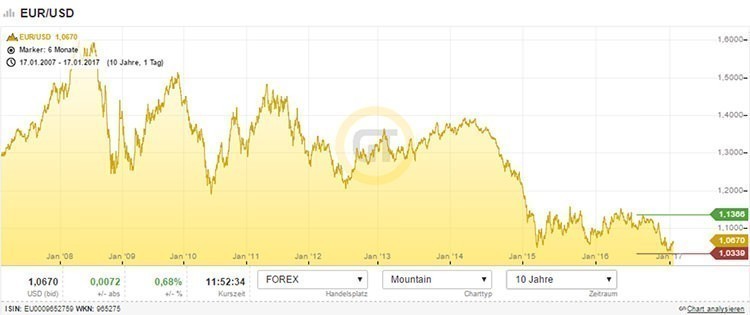A stable currency has its advantages: it secures the purchasing power of the population and the economy and ensures a safer investment climate. In that case, travels abroad are also relatively inexpensive. However, a strong domestic currency has one major drawback - it makes exporting to countries with weaker currencies difficult
Today, the dollar is considered the global reserve currency and is the most traded currency worldwide. Although the euro offers many advantages (quite a number of countries have already pegged their national currencies to the euro exchange rate instead of the dollar), it does not have the potential to replace the dollar as a reserve currency. The attached graph shows the movement of the EUR/USD exchange rate over the past 10 years.

The Serbian dinar is a currency the exchange rate of which is formally formed independently through a managed floating exchange rate system, but de facto, the domestic currency is tied to the euro. The National Bank of Serbia (NBS) intervenes on the foreign exchange market daily by selling and buying foreign currencies in order to steer the exchange rates, primarily of the euro against the dinar, in the desired direction and prevent excessive fluctuations. As part of these activities, NBS, according to its own data, sold 870 million euros and bought 375 million euros in 2016. In some domains, even a dual-currency system works - many services can be paid in foreign currency, receivables and liabilities are tied to the euro exchange rate, and salaries in many private firms are euro-indexed.
Although it offers many advantages, the euro does not have the potential to replace the dollar as a reserve currency.
According to all parameters, the current exchange rate of the euro is significantly undervalued compared to the dinar, which makes our exports expensive and imports favorable, which can be clearly seen from our foreign trade deficit, which is constantly growing, since the coverage of imports by exports is just around 75%. If it were not for the intervention of the NBS with the aim of preserving the stability of the dinar, we could expect the exchange rate of the euro against the dinar to increase every year for the difference in the inflation rate in Serbia and the euro zone.
According to all parameters, the current exchange rate of the euro is significantly undervalued compared to the dinar.
This would bring difficulties for drivers, debtors of euro-indexed loans and consumers of imported goods, but it would enable export growth, higher employment and more foreign tourists, who would find local specialties on Zlatibor and nightlife in Belgrade even more affordable.


